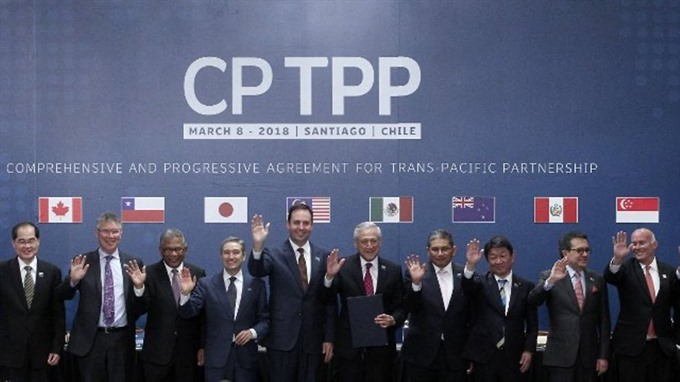 World
World

A massive trans-Pacific trade deal cleared a final hurdle Wednesday allowing it to enter into force this year, a pointed rebuke of President Donald Trump's protectionist policies from some of America's closest allies.
 |
| Ministers pose for an official picture after signing the rebranded 11-nation Pacific trade pact Comprehensive and Progressive Agreement for Trans-Pacific Partnership (CPTPP) in Santiago, Chile, on March 8, 2018. — AFP/VNA Photo |
SYDNEY — A massive trans-Pacific trade deal cleared a final hurdle Wednesday allowing it to enter into force this year, a pointed rebuke of President Donald Trump’s protectionist policies from some of America’s closest allies.
Hours before an administrative deadline, Australian Prime Minister Scott Morrison announced that his government had ratified the 11-country pact, meaning a quorum of more than half the members have formally signed on.
"Australia is the sixth country to ratify the agreement, meaning it can now enter into force on 30 December this year," said centre-right leader Morrison.
Other signatories include G7 economies Japan and Canada.
The so-called Trans-Pacific Partnership (TPP) has had an arduous birth and had appeared to be floundering when Trump withdrew US participation shortly after coming to office.
That turned out to be the opening salvo in Trump’s winner-takes-all, "America first" and threat-heavy approach to trade relations.
Frantic behind-the-scenes, Japanese-led diplomacy kept a slimmed-down version of the pact alive among the remaining members -- in the hope that Washington will have a change of heart, or government, and will eventually join.
The deal was spearheaded by then-president Barack Obama, who saw it as a geopolitical power play, with ramifications far beyond trade -- a way of binding rising Asian powers into a rules-based, American-backed order and countering China’s might-is-right approach to commerce in the Asia-Pacific region.
Even without the participation of the world’s largest economy, the deal has been described as a game changer.
It covers many rapidly growing economies that account for around 14 per cent of world trade.
Lower tariffs
As well binding countries into a tougher legal framework for trade, lowering tariffs and opening markets, the pact will also introduce new labour standards and force some governments to bring competition into sectors long dominated by insiders and political cronies.
Canada, Japan, Mexico, New Zealand and Singapore have already signed off on the agreement, meaning more than half of the members have ratified.
On December 30, a first round of tariff cuts will now come into effect.
"The timing means there will be the added bonus of a second round of tariff cuts on 1 January 2019," said New Zealand trade minister David Parker.
"I expect other signatories will come on board" he added, referring to the remaining five members who have not yet formally ratified -- Brunei, Chile, Malaysia, Peru and Việtt Nam.
"Many are working hard to progress their applicable domestic procedures," he said.
But not everyone is convinced the deal will transform the world.
With the US gone, "the TPP became a bulwark against protectionism, sustaining the flame for free trade until Trump leaves office and things return to normal," Tom Chodor, a professor at Australia’s Monash University recently wrote.
"As Trump continues to transform the Republican Party and the United States, the notion that things will go back to ’normal’ after his departure is looking increasingly problematic," he said. "Even without Trump, Trumpism might be here to stay."
"There is little chance of a US-less TPP exerting leverage on China," Chodor added.
Countries like Indonesia have indicated they would like to join, but would first need to embark on wholesale economic reforms that would threaten the business interests of local powerbrokers. — AFP




